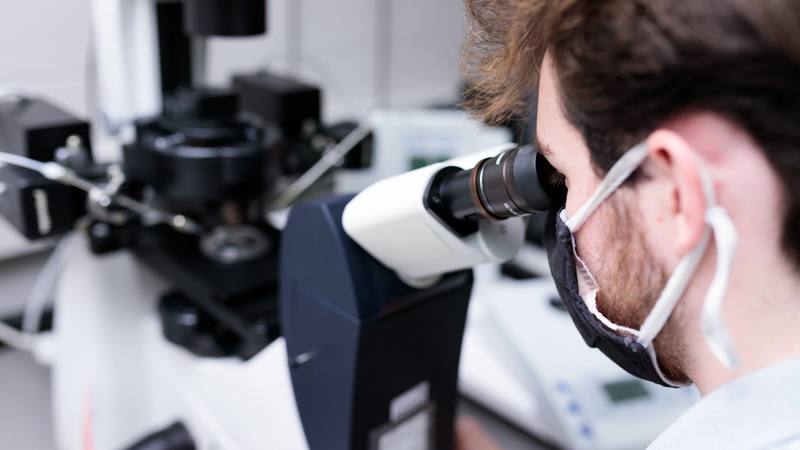-
Featured News
Minnesota Partnership for Biotechnology and Medical Genomics awards three collaborative research grants

(ROCHESTER and MINNEAPOLIS, Minn.) — Mayo Clinic and University of Minnesota are pleased to announce three collaborative research grants totaling $5.82 million through the Minnesota Partnership for Biotechnology and Medical Genomics (MNP). MNP is funded by the State of Minnesota and provides support for innovative research conducted by collaborative teams from the University of Minnesota and Mayo Clinic.
This year's awards support projects that seek to advance health outcomes in the areas of neuromodulation therapy, artificial intelligence-assisted care delivery, and T cell therapy for the treatment of graft-versus-host disease (GVHD) and inflammatory colitis.
2023 Funded Projects
Minnesota Precision Neuromodulation Center (MinPeNCe)
Theoden Netoff, Ph.D., University of Minnesota; Gregory Worrell, M.D., Ph.D., Mayo Clinic; Alex Opitz, Ph.D., University of Minnesota; Paul Croarkin, D.O., M.S., Mayo Clinic
Neuromodulation therapies, including deep brain stimulation, transcranial magnetic stimulation, transcranial alternating current stimulation, vagal nerve stimulation and spinal cord stimulation, are clinically approved for treating various neuropsychiatric disorders. Unlike pharmaceuticals, these therapies have many customizable parameters, but little guidance exists on selecting the optimal settings, which may vary for each patient. This program will create MinPeNCe, a center that will enhance neuromodulation therapies by optimizing them with patient-centered innovation and outreach. Mayo and UMN faculty and staff will support clinical studies on major depressive disorder and epilepsy, and later develop infrastructure to support pilot projects exploring Bayesian Optimization, artificial intelligence, brain state tracking analytics, wearable devices and molecular platforms for future dose finding studies. The goal of the center is to develop more equitable use of neuromodulation therapies for patients and support a more diverse scientific community.
ENTRUST AI: ENsuring the TRUSTworthiness of AI/ML Models to Optimize Continual Patient Safety
Genevieve Melton-Meaux, M.D., Ph.D., University of Minnesota; Pedro Caraballo, M.D., Mayo Clinic; Gyorgy Simon, Ph.D., University of Minnesota; Hongfang Liu, Ph.D., Mayo Clinic
Despite a rapid increase in uses of artificial intelligence (AI) and machine learning (ML) in society, medicine's embrace of this technology is lagging other areas. Accelerating the use of AI and ML in clinical medicine requires trustworthy models with reliable predictions and established risk management processes. This project proposes to develop innovative informatics solutions and to apply and extend a consensus-driven risk management standard to ensure safety and trustworthiness of AI/ML for decision support in clinical practice with individualized risk management. Funding of this project is aimed at increasing safety, trustworthiness and fairness in AI-assisted care delivery, positioning ENTRUST to improve the health of Minnesota broadly and generate real-world knowledge from Minnesota’s experience in clinical AI best practices.
Targeting CD103 with engineered cell therapy for the treatment of GVHD
Bruce Blazar, M.D., University of Minnesota; Saad Kenderian, M.B., Ch.B., Mayo Clinic
Development of acute graft-versus-host disease (GVHD) is the leading cause of death following bone marrow transplantation. Current treatments using steroids are ineffective for about half of patients. The research team has found that the donor’s immune cells (T cells) use a protein referred to as CD103 to move to and locate the recipient's organs and attack them, causing GVHD. Targeting CD103/gut integrins is applicable for inflammatory bowel diseases. Chimeric antigen receptor therapy (CAR T-cell therapy) engineers the patient's own immune cells to attack CD103 and potentially prevent GVHD. This project aims to further study how CD103 affects GVHD, and to develop and test CART103 and engineered regulatory T cells in the treatment of GVHD. This project [SE(A1] seeks to offer targeted treatments for GVHD with more precise and personalized approaches to treatment than currently available.
Throughout the two-year funding period, these projects will receive translational expertise and other project-management support from the University of Minnesota Office of Discovery and Translation and the Mayo Clinic Office of Translation to Practice. These offices support funded project teams developing novel innovations.
The grant application required that proposals include a plan for a large, highly competitive, center-level team application for funding within three years of the MNP award. Projects that lead to center-level funding offer great potential to promote interdisciplinary collaboration, accelerate the development of new therapies, and create more impactful and innovative research capabilities and infrastructure for the benefit of the people of Minnesota.
The MNP initiative provides funding and support for the development of interventions, programs and treatment approaches across the entire spectrum of biomedical and health care research with the ultimate goal of improving health outcomes for Minnesotans.
The next MNP funding opportunity will be announced in Q2 2023.
###
About the Minnesota Partnership for Biotechnology and Medical Genomics (MNP)
MNP is a joint, state-funded program between the University of Minnesota and Mayo Clinic in Rochester. The MNP program is jointly administered by the U of M Office of Academic Clinical Affairs, the Office of Discovery and Translation in the U of M Clinical and Translational Science Institute (CTSI), and the Mayo Clinic Office of Translation to Practice.
About Mayo Clinic
Mayo Clinic is a nonprofit organization committed to innovation in clinical practice, education and research, and to providing compassion, expertise and answers to everyone who needs healing. Visit the Mayo Clinic News Network for additional Mayo Clinic news.
About the University of Minnesota
The University of Minnesota System, with campuses in Crookston, Duluth, Morris, Rochester and the Twin Cities, is driven by a singular vision of excellence. We are proud of our land-grant mission of world-class education, groundbreaking research and community-engaged outreach, and we are unified in our drive to serve Minnesota. Visit system.umn.edu.
Media contacts:
- Susan Buckles, Mayo Clinic Communications, newsbureau@mayo.edu
- John Merritt, CTSI Communications, merri205@umn.edu







